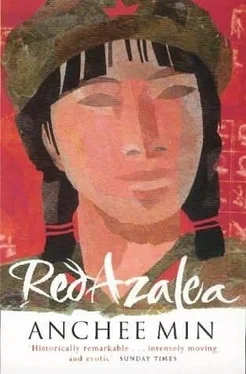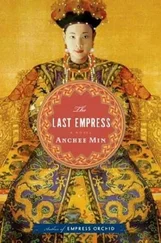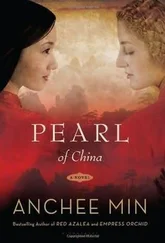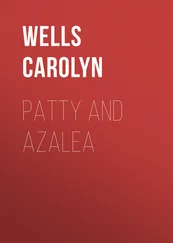Soviet Wong did not talk more to her than to the others. But things moved for Cheering Spear. She was put onstage to lead the crowd in the reading of Mao’s new instructions. Cheering Spear became the center of attention. The newspaper and magazine reporters and photographers spoke with Cheering Spear. They interviewed her. They asked who she was and where she was from. Cheering Spear never changed her words. She said, I am Soviet Wong’s student. I am what she made of me. I am the soil and she is the cow who cultivates me. I am her harvest. Cheering Spear did not say anything else; she only said what was useful. The newspaper praised Soviet Wong as an example of the Party’s loyalty.
The race for Red Azalea came down to Cheering Spear and me. Soviet Wong said we must practice hard because the Supervisor from Beijing would soon come to take his pick for Comrade Jiang Ching. Nothing was said about the others. No one told them that their chance was thinner than a thread. Soviet Wong decided to call Cheering Spear candidate A and me candidate B. It was becoming obvious that Soviet Wong preferred her over me. But she had to leave me in the race at least for a while, because it would have been too blatant if she had not. She could not put me aside when it was always Cheering Spear and I who gave the right answers to the questions in class. Our scores had always been close. In Mandarin class we were the only two who were able to get the one-hundred-syllable pronunciation table right. Soviet Wong had to show her fairness, because she represented the Party.

Always in our classes Soviet Wong would be very abstract in what she asked me to do so that I would find it difficult to follow her. Then she told me that I reacted to her teaching too quickly. You have not been really listening to me, she said. You refuse to listen. But I do listen, I said. She was teaching us how to improvise in the character of Red Azalea. What are you wearing? she asked, suddenly pointing at my feet. A pair of self-made straw shoes, I replied, satisfied with my own sharp wit. She smiled almost bitterly. What do the shoes look like? They look like the ones Chairman Mao wore in a photo filmed by our foreign friend Anna Louise in Yanan cave, I said.
Soviet Wong looked even more bitter. She told me to watch Cheering Spear practice. Watch each other, she ordered. Watch carefully. I did watch carefully. Even when I closed my eyes, I could see how Cheering Spear played Red Azalea. Cheering Spear was an ardent performer, an energetic spirit. She exhausted herself. She gave all of herself. She was lavish with her emotions. She had no use for subtlety in performance. She loved to be melodramatic. Soviet Wong asked me to watch, so I watched. I learned what was not working and I knew I would not perform the same way. When Soviet Wong asked me what I had learned for the day, I answered honestly. And I ruined myself. When I realized that I had ruined myself, it was too late.
The air in the studio became chilly. The chilliness penetrated my bones. Soviet Wong suddenly pointed at me and asked me to explain the concept of the proletarian dictatorship over revisionism in art. It did not take me too long to form an answer. In order to discard revisionism, I said, we must exercise the dictatorship over the enemy in our own head first. My voice was clear. The content was from Red Flag magazine. Soviet Wong commented, We must be careful of those who are giants in language but midgets in practice.
Soviet Wong picked on me. She picked on me whenever she could, over the smallest things. One day she misplaced a prop-a tea mug-and pointed me out to the class as the one who must have lost it. I told her I had seen her place the mug in her drawer. I went to point at the particular drawer backstage. She came and pulled the drawer out. In it was the missing mug. Soviet Wong was furious. She recited Mao’s teaching: “The one who thinks she is smarter than the masses is the one who will be abandoned by the masses.” I was confused and angry.
Soviet Wong never regarded us as a teacher did her students, but as an old concubine did newcomers. She did not know how to confront the danger we represented. Comrade Jiang Ching’s desire to change the image of movies and her affection for working-class-looking youngsters killed Soviet Wong’s future as an actress. Her ancient beauty was considered out of date. She never truly liked Cheering Spear. In fact, she hated her. But Cheering Spear’s flattery made her feel less hurt.
Cheering Spear had a smoother look than I did. The harsh lines of my features irritated Soviet Wong. She was at a loss for Comrade Jiang Ching’s new esthetic of beauty when it came to my rough skin. Every morning when she saw me, she stared at me with an expression of having just swallowed a fly. Have you washed your face? she would ask disgustedly.
Soviet Wong would shake her head before I delivered my line. Nothing I did looked right to her. Many times her deep resentment turned to a hatred that expressed itself on impulse. Your irises are not big enough, she said, gazing at me. They won’t appear as bright as a heroine’s should on-screen. Comrade Jiang Ching’s requirement of a leading actress is that she have a pair of bright flaming eyes. Those eyes symbolize proletarian righteousness. I do not see that you have them. It’s a terrible pity. Really, maybe you should not have been picked up in the first place. It was definitely a misjudgment. Sloppiness will certainly spoil things.
Soviet Wong asked me to tell her whether I was nearsighted. I said I was not. She took me to the studio’s medical center and had a doctor check my vision. I had perfect sight. On our way out, Soviet Wong said to me, But you do look nearsighted, believe me.
I looked at myself in the mirror that night. After a half hour of studying the size of my irises, I started to believe Soviet Wong. It was true that my irises were not as big as they were supposed to be. From then on, I could not forget that I looked nearsighted. In my performance I became more and more conscious of my looks. My sense of self-confidence was disappearing. Soviet Wong yelled, Stop! before I even started my lines. She said, The way you stand is wrong. You forget that your feet should form a forty-five-degree angle. Day after day I felt more and more like I was too crippled for Red Azalea. Soviet Wong weakened my nerves. But I refused to quit. I knew exactly what she wanted and I just could not give it to her.
Soviet Wong gradually dropped my lessons. She arranged for me to work in the cafeteria to help shell peas. She made me wait at the bottom of the list to receive acting lessons. Sound of Rain did not seem to object to what Soviet Wong was doing to me. He seemed to trust her judgment. They both began to say that they did not want to ever produce capitalist sprouts. I knew what was happening as did everyone else in the studio. But no one said anything. No one dared to oppose Soviet Wong.
I kept myself composed. I stopped pretending to be who I was not, because there was no way to please Soviet Wong anyway. She had convinced Sound of Rain and now everyone around me to dislike me, and they did. They all wanted to please Soviet Wong. They began to say that Cheering Spear seemed to be the only qualified candidate, because she acted with passion. By passion they meant how many tears an actor could shed. I had to admire her talent in reciting dry, sloganlike lines with such passion. Cheering Spear was a big tear machine. Shedding tears was the only thing she pursued when acting. Not only did she shed tears; she could make the right amount of tears pour out at the right moment without dragging out the snot. Getting the tear to drop was Cheering Spear’s concept of acting.
Читать дальше













